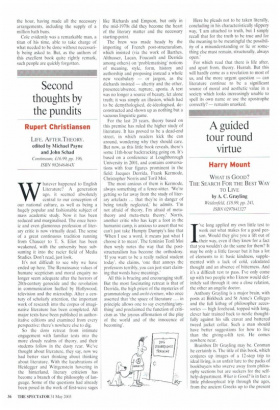A guided tour round virtue
Harry Mount
WHAT IS GOOD? THE SEARCH FOR THE BEST WAY TO LIVE by A. C. Grayling Weidenfeld, £18.99, pp, 241, ISBN 0297841327 I've long applied my own little test to work out what makes for a good person. Would they give you a lift out of their way, even if they knew for a fact that you wouldn't do the same for them? It may be only a little favour but it has a lot of elements to it: basic kindness, supplemented with a lack of cold, calculated thought and an absence of bitterness. And it's a difficult test to pass. I've only come up with two people who I know would definitely sail through it: one a close relation, the other an angelic doctor.
Anthony Grayling is a major brain, with posts at Birkbeck and St Anne's Colleges and the full kitbag of philosopher accessories — high forehead, topped with long, clever hair trained back to nestle thoughtfully against his silk cravat and battered tweed jacket collar. Such a man should have better suggestions for how to live than the giving-a-lift test. He comes nowhere near.
Brainbox Dr Grayling may be. Conman he certainly is. The title of this book, which conjures up images of a 12-step trip to ideal living, is an unfair lure to the packs of bookbuyers who swerve away from philosophy sections but are suckers for the selfhelp department. What is Good? is in fact a little philosophical trip through the ages, from the ancient Greeks up to the present
day, vaguely covering what great thinkers through the ages have thought of virtue. It's a useful crib if you don't know your Nietzsche from your Kant, but it won't bring canonisation any closer.
It turns out that it's a long time before any Greek thought there was anything more to goodness than martial virtue. It was Xenophon who came up with the revolutionary idea that respect, friendship and prosperity tended to get the endorphins going as much as killing people.
Thereafter, the wise men lost their way a bit. The Cynics, who weren't in fact cynical, were principally behind a life of simplicity and naturalness, and their chief representative, Diogenes, took the life to its extremes. He went about in a dirty cloak, refusing to wash and performing all his natural functions, including masturbation, in public.
There are people like Diogenes all over Britain. They're called tramps, and it's hard to spot any intrinsic good in them, so why include Diogenes here? The same goes for many of the other crackpot thinkers that Grayling covers in his admirably pithy thumbnail sketches. It's terrific fun to hear about Marie Bonaparte, the woman who established Freud's theories in France, and particularly about how vexed she was by the knotty problem of vaginal versus clitoral orgasm; SC) vexed in fact that she had two surgical operations to move her clitoris closer to her vagina, to kill two birds with one stone, as it were.
But these little vignettes don't get us any closer to defining what you should do to be good. As with practically anything in life, it's much easier to say what you shouldn't do. And Dr Grayling's main warning is DON'T BE RELIGIOUS. In the battle between science and religion, he thinks, science always wins: it did in the 18th century enlightenment, it did in Darwin's wars with the Creationists, and it will go on doing so as geneticists sort out every conceivable problem with the human body.
The fact that old ladies, say, manning the church tombola stall do some good, as do young monks distributing alms, is by the by in the Grayling world. They are just plain wrong to follow a spiritual course, for no better reason, it seems, than that most human progress has occurred in the face of religious reaction, and that religion is behind an awful lot of wars and oppression.
His final recommendations for a good life, shoehorned in at the end of his circuitous tour of the ages, are avowedly secular: individual liberty, the pursuit of knowledge. the cultivation of pleasure, the satisfactions of art, personal relationships and a sense of belonging to the human community. All very agreeable accessories, yes. But you could have them all in spades and still refuse to give someone a lift somewhere that wasn't directly on your way home.



































































 Previous page
Previous page